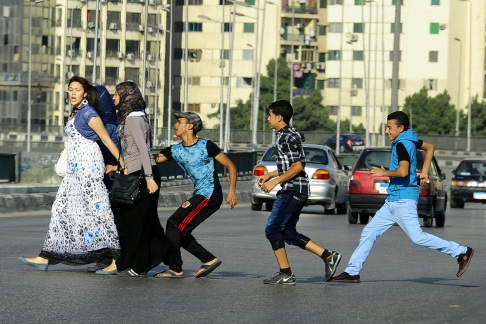Sexual harassment: a constant in Egyptian women’s life
 “Their hands were all over my body and up and under my destroyed clothes. Again, my pants and underwear were pulled down violently and several men, at the same time, raped me with their fingers”. This is part of a testimony of a victim that was raped during the protests in Tahrir Square in June 2012. It is one of more than 20 stories that Egyptian human rights organisations have compiled from victims and witnesses from 2011 to 2013.
“Their hands were all over my body and up and under my destroyed clothes. Again, my pants and underwear were pulled down violently and several men, at the same time, raped me with their fingers”. This is part of a testimony of a victim that was raped during the protests in Tahrir Square in June 2012. It is one of more than 20 stories that Egyptian human rights organisations have compiled from victims and witnesses from 2011 to 2013.
The testimonies tell a similar story each time: hundreds of men surrounding the victim and tearing-off clothes, veils and underwear to touch her violently and, in the worst cases, to rape her with their fingers and even sharp objects.
Sexual harassment, either verbal or physical, has become rife in Egypt, in particular, in the heart of the Cairo protests – Tahrir Square. Over 100 cases of sexual assault were reported during the last demonstrations that let the army take over and depose the president, Muhammad Morsi.
These numbers highlight the failure of the government and political institutions to address violence against women in Egypt. “No one had ever been accountable for what happens in Tahrir Square or during demonstrations. For example, in January 2013, cases were documented but there was no reaction from the government, no investigations were opened. People know that whatever happens in the square, there will never be any accountability for it”, explains Masa Amir, a researcher at Nazra Feminist Studies in Cairo.
Sexual harassment is an epidemic in the country, as is reflected in a UN Women study that reported that 99.3% of women in Egypt have suffered one form of sexual harassment or another; the majority saying to have been touched.
Amir denounces the inaction of the political institutions that “rather to address the issue, they use it as a political tool against the opposition”. She gives the example of Essam Al-Haddad, Assistant to the former President on Foreign Relations and International Cooperation, who drew a line between the two demonstrations on 29th June to conclude that the assaults indicate that the “crowds in Tahrir are out of control”.
The ones who are addressing the issue in Egypt are mainly individuals and civil societies who have launched grassroots initiatives to support women and raise awareness of violence against women.
For example the ‘HarassMap’ is an online initiative for victims and witnesses all over Egypt to anonymously share their experiences of harassment, and to report it through mobile phones and social media. The map collects all reports with information that tells the user what kind of harassment was and where it happened.
There is also the initiative of the Tahrir Bodyguards – volunteers that can be recognised by their yellow helmets and neon vests during the protests. They try to prevent sexual harassment while women are in the streets protesting.
A cartoon has also been created. It is Superrmakh – an Egyptian superhero, inspired by Superman cartoons, who helps women and girls stop their harassers.
With this initiative, Ahmed Makhloufto, the creator of Supermakh, wanted to break a taboo within Egyptian society by talking openly about sexual harassment and highlighting the pretexts and other factors that allow for it to continue.
The figures provided on sexual harassment in Egypt may be even higher as many cases remain unreported. The UN Women’s report stated that only 0.3 of women who were harassed contacted the police.
In Egypt, denouncing the harasser is a challenge for the victim as the police tend to convince the women not to pursue it further. “The police usually say it is ok, nothing really happened. Why do you want to get this man into trouble? And even if they document what happened, it is not treated urgently. The survivors often think that if they go to the police, they will be put under a lot of stress, no investigation will take place and nothing will come out of it”, confirms Amir.
The victims face a culture of impunity, denial and inaction regarding sexual harassment in a country where there is also a social wall to overcome. “The victims need a very supportive family and to be strong enough to speak out because our society tends to blame the girls for being harassed. They cannot tell their father or brother because she will be blamed. They usually say: you may have done something wrong or worn something that was not decent. And if they don’t blame her, they tell her not to talk about it because it will bring shame and disgrace to the family”, explains Nada Nashat from Centre for Egyptian Women Legal Assistance (ECWRA).
Despite all the obstacles, Nashat affirms that the number of women who speak out and report the harassment has increased. Another testimony of a victim of sexual harassment concluded, “we will not be frightened; we will not hide in our homes”.

Great article, Lorena!
LikeLike
Thank you,Lorena! Why is it that the authorities do not take action? I read somwhere that General Sisi tried to justify administring virginity tests to women protestors. Is this true?
LikeLike